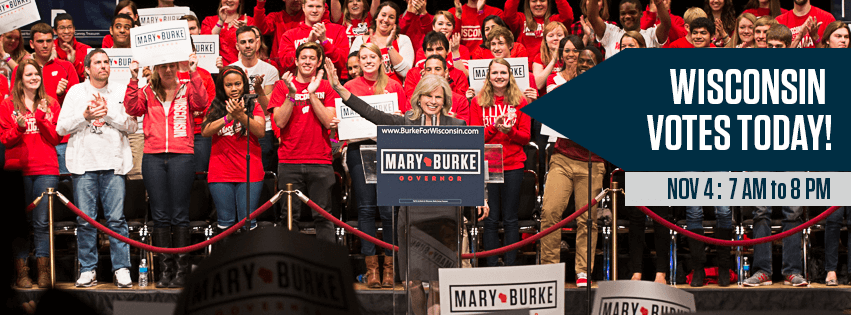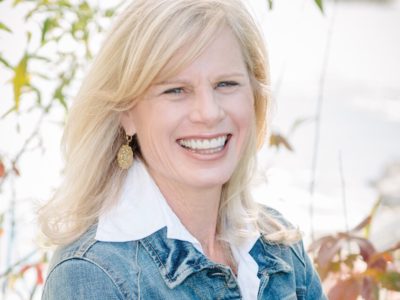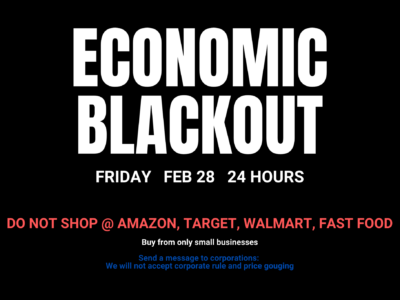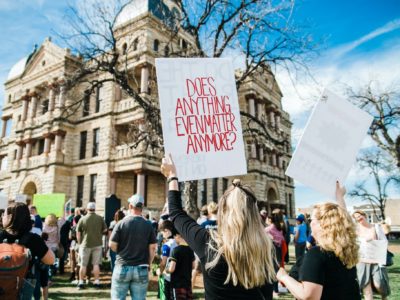The place we start isn’t always where we end up. Mary Burke had no political aspirations growing up, or even in college. She was a business woman who stepped up when her state needed her. Starting out as secretary of commerce in Wisconsin at the urging of a friend, she ran for governor in 2014. Though her campaign was unsuccessful, her journey brought her to a realization that it’s not always about the end result. And not only that, but through challenging herself found a new confidence that she hopes to instill in other women through her organization Building Brave.
Mary Burke Career Timeline
1985 – Graduated from Georgetown University with a degree in Business Administration
2005 – Was appointed secretary of commerce in Wisconsin
2012 – Elected to the Madison, Wisconsin school board
2014 – Ran for governor of Wisconsin
2015 – Founded Building Brave
Q&A with Inspirational Women Leader Mary Burke
Q: At College Magazine we’re working together with EMILY’s List, Emerge America, Human Rights Campaign, Higher Heights, She Should Run, Victory Fund and IGNITE on an initiative to fight for equal representation in congress called “50 by 2050.” What are your thoughts on the goal of achieving 50% of women in congress by 2050?
A: I’m glad that it’s a goal and that you’re coming together with a number of organizations to put in place a plan and get excitement going around it.
Q: How did you decide to get involved in politics?
A: Well, for most of my adult life I thought voting was being really political. That was about as political as I got. I was a business person and grew up in a family that was largely independent, so I got involved when I was asked to be secretary of commerce for the state of Wisconsin. I pretty much took a leap of faith in making that change from the private sector to government and really enjoyed it. It certainly opened my mind to the importance of issues, public policy, and leadership in our government.
Q: What are some of the issues that you’re most passionate about?
A: There are a number of them. At this point I’m working really hard and am excited about the work that I’m doing with regards to seeing that women have the opportunities and support to realize their potential and started an organization called Building Brave. Our mission is for women to discover their most confident selves. I’ve also been a long-term advocate and very much involved in education and seeing that really is a way that we can bridge some of the gaps that exist. And I was just brought up to believe that if you work hard enough, that you can achieve anything that you want. But the fact is that varies dramatically based on the opportunities and the support that you’re given. So I’ve worked really hard to try to make sure that others who didn’t have those same sorts of opportunities and supports that I did, get them.
Q: How did you start your journey with Building Brave? Where did that come from?
A: After I ran for governor, so that was November 2014, I read a book called “The Confidence Code.” And if you had asked me previously about confidence and women, I would’ve said, “I’m good. I have not been a shrinking violet,” and yet when I read the book, I found myself realizing that I had played smaller than my abilities for much of my life. Whether it was asking for pay raises or going after jobs, I realized that every leadership position I had was because other people had come to me and said, “Mary, you should do this, you would be really good.” Basically other people had seen the potential in me that I didn’t always see in myself.
That was certainly true in running for governor. I took that on largely because no one else that could run a really credible campaign was stepping up. Of course I’d love to be governor of Wisconsin, but in reading the book and seeing the research, it made me think about my own experience. Even though I lost the campaign, and it was a pretty nasty campaign, I never felt stronger or more confident in my life. For 13 months I was forced way out of my comfort zone. I was pushed to do things I had never done before, whether that was public speaking or media interviews. And in doing that, I found a confidence in myself that I never realized, and I decided that I wanted to find a way that other women could discover their most confident selves—without running for governor.
Q: What did your journey look like in transitioning from business to politics? Where did you get started?
A: The first position was serving as the secretary of commerce for the state of Wisconsin. That was certainly different for me. It was serving in government, but it was a leadership position running a branch of the government and I felt very comfortable running the organization. The more public aspect of it is something you don’t do a lot of as a business person and I really enjoyed it. I was representing the state. I would travel around. It wasn’t as politically oriented as maybe some other positions so I would say I was still pretty inexperienced or unprepared for running for governor when I decided to do that.
Q: Did you face any challenges in particular as a woman in politics during your run for government?
A: I think women hear a lot more. I’ve never heard it said of a man, but I remember having coffee shortly after the campaign with one of my staff people who ran special events and she said, “You know, if one more person said to me, if Mary could just smile a little bit more…” I don’t think anyone says that about men needing to smile more. It’s pretty tough running for governor and wanting to come across as being tough enough to do the job, and still needing to smile at the same time. There’s a lot of judging going on, whether or not you’re a man or a woman, but certainly there’s no doubt that women will be judged more on their appearances than men.

Not only do they need to be viewed as being competent, just as men are, but they also need to be viewed as being likeable. It’s a hard line or path to balance because you do have to come across as being tough, and yet when women act tough, it’s hard for them to also be perceived as being likeable.
Q: We’ve seen in particular in the last few months a lot more women starting to run for office. How do you feel that will end up shaping our political landscape?
A: I think it’ll be great. Women are 50 percent of the population and a diversity of viewpoints will only make us better. I’m glad to see a lot more women running. There’s definitely the research that shows women need to be asked to run far more times than men before they will accept it. I know I took the decision incredibly seriously and did four months of research, and it wasn’t an easy decision at all. I don’t think I would have run if there were other viable candidates stepping up, but because Wisconsin there weren’t a lot of choices among the regular pool of candidates you’d normally look to. It wasn’t individual initiative that got me to think about it though, it was other people.
I talked to a young woman during the Women’s March here in Madison and she was thinking of running and I said, “What holds you back? Is it the possibility that you might lose?” And she said, “No, no, not that. It’s just what other people will think.” There’s a lot of conditioning that goes on in which it’s uncomfortable for women to stand up and toot their own horns—which is what running for office feels like. Standing up and tooting my own horn was as comfortable as running down the street naked when I first started doing it. It was not anything I wanted to do. I think that is a really difficult part to overcome, but there’s no doubt that women are as well-suited to leadership and politics and government as men. We have a lot of examples of that and I think some of the best work that’s been done in a divisive Congress has been done by women reaching across the aisle. And I do believe we need women on both sides of the aisle. It’s important that across party lines, women are seen in leadership positions and as elected officials.
Q: Has there been a moment in your career that you’ve found the most rewarding?
A: I always believe that life is a journey and what I realized in running for governor is that even though I got dragged through the mud for 13 months, and I lost, in an incredibly public way, it was the best decision I ever made in my life. It opened up a whole new world. I developed skills and abilities that I didn’t even know I was capable of. It opened up doors that will be open to me for the rest of my life and my community got incredibly big and I met amazing people.
I’ve always been a person who focused on the end goal. Did you reach it? Did you succeed? And in this case, I came up short. And yet, it really was the journey that might have been more valuable. And that’s why I say to people all the time, when they ask me if they should run—yes. Yes. Run to win. Don’t run just for the journey, run to win, but don’t underestimate all of the positive things that can come out of it, even if you don’t win.
How You Can Become a Powerful Woman Leader
1. Get Involved
“Regardless of what party you are a part of or what you believe, there are issues, whether in student government or city government or on campus, there are ways to become involved,” said Burke.
2. Find your passion
“For everyone it’s different, and where you start may not be where you end up but you won’t know unless you try. My advice is just do it and you’ll figure out along the way where your passion is and what you enjoy doing most. But we do need young people involved and that’s going to make a big difference,” said Burke.
How to Connect with Mary Burke
Contact her via Building Brave: https://www.buildingbrave.org/contact-us
Email: [email protected]
Phone: (608) 616-5248



















